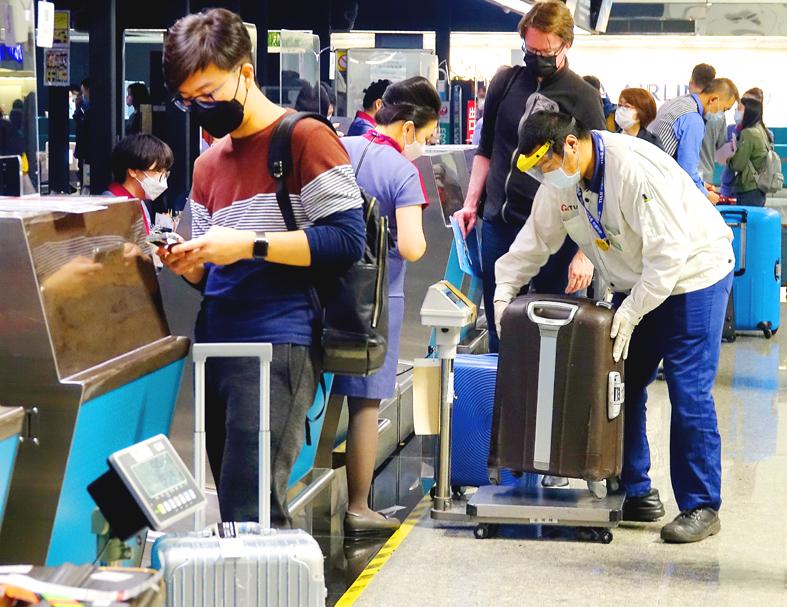The Central Epidemic Command Center (CECC) might shorten the quarantine period for inbound travelers to seven days after observing the COVID-19 situation for about a month, Minister of Health and Welfare Chen Shih-chung (陳時中) said yesterday.
Chen, speaking at the Taipei Hotel Association’s annual banquet, said that while people in the tourism industry have suggested a “3-5-7” plan — reopening the border to business travelers this month, reopening to foreign tourists in May and allowing Taiwanese to travel abroad in July — the virus situation is uncontrollable, so the dates are difficult to set in advance.
However, the minister said there is a “7-5-3” quarantine plan that includes “priority travel bubbles” that is being mapped out.

Photo: Chu Pei-hsiung, Taipei Times
The plan is to gradually reduce the mandatory quarantine period for inbound travelers from 10 days to seven days, then five days, then three days, before a full reopening without quarantine, said Chen, who heads the center.
The impact of reducing the quarantine period from 14 to 10 days, which took effect on Monday last week, would be monitored for a month and if the COVID-19 situation remains stable, the quarantine period could be further reduced to seven days, Chen said.
The risk of undetected COVID-19 cases among travelers quarantined for 10 days is about 1 percent, but the risk increases to 3.5 percent if they quarantine for seven days, he said, adding that preparations must therefore be made in advance.
The preparations would include teaching businesses in the tourism industry how to quickly handle the situation if an employee or customer tests positive for COVID-19 to stop the virus from spreading.
Reducing the quarantine period to fewer than seven days might be an incentive for more overseas Taiwanese, students and business travelers to visit Taiwan, but it would need to be reduced to fewer than five days to attract foreign tourists, which would be challenging as an expected 20 percent of cases could remain undetected after five days, he said.
Asked if allowing foreign tourists to visit Taiwan could be possible in May, Chen said it is most unlikely that they would be able to arrive and travel freely by May, but the center would also consider “priority travel bubbles” being suggested by the tourism industry, as well as assessing the global COVID-19 situation and local preparations, including vaccination coverage.

BUILDUP: US General Dan Caine said Chinese military maneuvers are not routine exercises, but instead are ‘rehearsals for a forced unification’ with Taiwan China poses an increasingly aggressive threat to the US and deterring Beijing is the Pentagon’s top regional priority amid its rapid military buildup and invasion drills near Taiwan, US Secretary of Defense Pete Hegseth said on Tuesday. “Our pacing threat is communist China,” Hegseth told the US House of Representatives Appropriations Subcommittee on Defense during an oversight hearing with US General Dan Caine, chairman of the Joint Chiefs of Staff. “Beijing is preparing for war in the Indo-Pacific as part of its broader strategy to dominate that region and then the world,” Hegseth said, adding that if it succeeds, it could derail

CHIP WAR: The new restrictions are expected to cut off China’s access to Taiwan’s technologies, materials and equipment essential to building AI semiconductors Taiwan has blacklisted Huawei Technologies Co (華為) and Semiconductor Manufacturing International Corp (SMIC, 中芯), dealing another major blow to the two companies spearheading China’s efforts to develop cutting-edge artificial intelligence (AI) chip technologies. The Ministry of Economic Affairs’ International Trade Administration has included Huawei, SMIC and several of their subsidiaries in an update of its so-called strategic high-tech commodities entity list, the latest version on its Web site showed on Saturday. It did not publicly announce the change. Other entities on the list include organizations such as the Taliban and al-Qaeda, as well as companies in China, Iran and elsewhere. Local companies need

CROSS-STRAIT: The MAC said it barred the Chinese officials from attending an event, because they failed to provide guarantees that Taiwan would be treated with respect The Mainland Affairs Council (MAC) on Friday night defended its decision to bar Chinese officials and tourism representatives from attending a tourism event in Taipei next month, citing the unsafe conditions for Taiwanese in China. The Taipei International Summer Travel Expo, organized by the Taiwan Tourism Exchange Association, is to run from July 18 to 21. China’s Taiwan Affairs Office spokeswoman Zhu Fenglian (朱鳳蓮) on Friday said that representatives from China’s travel industry were excluded from the expo. The Democratic Progressive Party government is obstructing cross-strait tourism exchange in a vain attempt to ignore the mainstream support for peaceful development

ELITE UNIT: President William Lai yesterday praised the National Police Agency’s Special Operations Group after watching it go through assault training and hostage rescue drills The US Navy regularly conducts global war games to develop deterrence strategies against a potential Chinese invasion of Taiwan, aimed at making the nation “a very difficult target to take,” US Acting Chief of Naval Operations James Kilby said on Wednesday. Testifying before the US House of Representatives Armed Services Committee, Kilby said the navy has studied the issue extensively, including routine simulations at the Naval War College. The navy is focused on five key areas: long-range strike capabilities; countering China’s command, control, communications, computers, cyber, intelligence, surveillance, reconnaissance and targeting; terminal ship defense; contested logistics; and nontraditional maritime denial tactics, Kilby